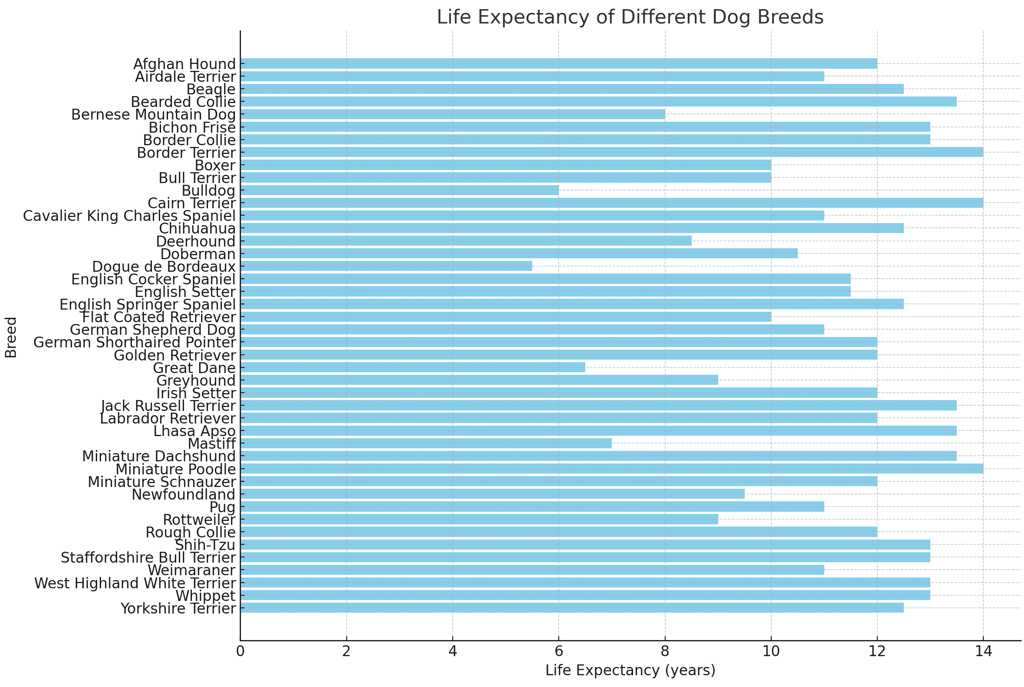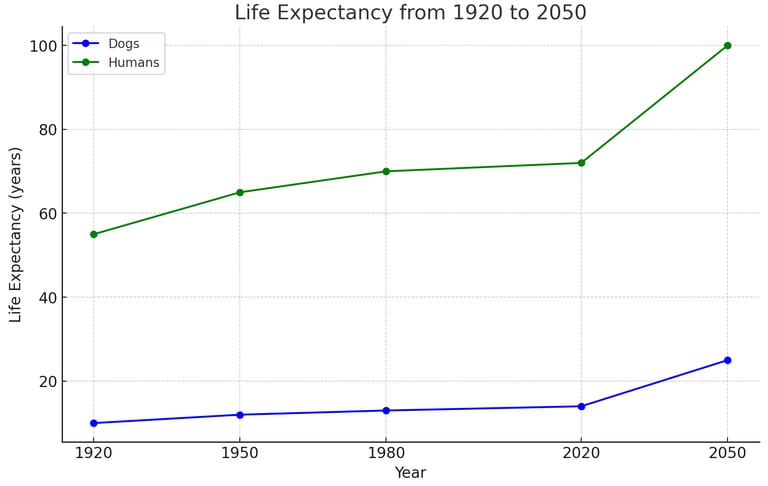Unlocking the Secret to a Longer Life for Your Dog: What Every Pet Parent Needs to Know
Nutrition is 30% of the longevity factors that influence Dog Life Expectancy. And in this Blog you will learn what is in your hands to extend the time that you and your dog can enjoy bonding and love together.
Nacho the Vet and Pets Lover
8/3/20246 min read


What can you do to help your dog live longer ?
The Shocking Truth About Dog Longevity: Are We Doing Enough?
Many of us believe that providing love, shelter, and food is all it takes to ensure our dogs live long, healthy lives. But the reality is far more complex. Despite our best intentions, many factors contributing to a dog's longevity are often overlooked or misunderstood. Are we truly doing everything we can to give our furry friends the best possible life?
How to Maximize Your Dog's Longevity: The Real Solutions Within Your Reach
As a devoted pet parent, you have more power than you might realize to extend your dog's life and enhance their well-being. Understanding and leveraging the factors you can control is key to maximizing your dog's longevity. Here are practical, feasible actions you can take to make a significant difference.
Introduction: The Bond Between Pet and Parent
Our dogs are more than just pets; they are family. They bring joy, companionship, and unconditional love into our lives. As pet parents, it's our responsibility to ensure they have the healthiest, happiest lives possible. But what does it really take to extend a dog's lifespan? Let's delve into the actionable steps you can take today.
Main Body
Understanding the Factors Influencing Dog Longevity
Genetics: While you can't change your dog's genetic makeup, being aware of potential hereditary issues can help you take preventative measures.
Diet: Nutrition plays a crucial role in your dog's health. Feeding your dog a balanced, high-quality diet can prevent numerous health problems and extend their life.
Exercise: Regular physical activity is essential for maintaining your dog's physical and mental health. It helps control weight, improves cardiovascular health, and provides mental stimulation.
Healthcare: Access to regular veterinary care is vital. Preventative healthcare, early detection, and treatment of diseases can significantly impact your dog's lifespan.
Living Environment: A safe, clean, and enriching environment contributes to your dog's overall well-being.
Breeding Practices: If you're considering getting a new dog, choosing a reputable breeder who prioritizes health can make a significant difference.
Preventive Care: Regular preventive measures such as parasite control and dental care play a significant role in maintaining health.
Vaccinations: Keeping dogs up-to-date on vaccinations helps protect them from various infectious diseases.
What You Can Do: Actionable Steps for Pet Parents
Diet: The Foundation of Longevity
A high-quality, balanced diet is fundamental to your dog's health and longevity. Here's how you can ensure your dog gets the best nutrition:
Choose the Right Food: Select a diet that meets all your dog's nutritional needs based on their age, size, and health status.
Avoid Overfeeding: Obesity is a major risk factor for many health problems. Follow feeding guidelines and avoid giving too many treats.
Provide Fresh Water: Always ensure your dog has access to clean, fresh water.
Takeaway Points:
Quality Matters: Invest in high-quality dog food tailored to your dog's specific needs.
Portion Control: Be mindful of portion sizes to prevent obesity.
Hydration: Ensure your dog always has access to fresh water.
Exercise: Keeping Your Dog Active and Healthy
Regular exercise is crucial for your dog's physical and mental health. It helps control weight, improves cardiovascular health, and provides mental stimulation.
Daily Walks: Ensure your dog gets regular walks suitable for their breed and energy level.
Playtime: Engage in interactive play to keep your dog mentally stimulated.
Training: Incorporate training sessions to challenge your dog and strengthen your bond.
Takeaway Points:
Routine Walks: Commit to daily walks to maintain physical health.
Interactive Play: Engage in play to stimulate your dog's mind.
Training: Use training as a form of mental exercise.
Healthcare: Preventative and Routine Care
Regular veterinary care is essential for early detection and treatment of health issues. Preventative care can significantly impact your dog's lifespan.
Regular Check-Ups: Schedule annual veterinary visits for a comprehensive health check.
Vaccinations: Keep your dog’s vaccinations up-to-date to prevent infectious diseases.
Parasite Control: Use preventive measures against fleas, ticks, and heartworms.
Takeaway Points:
Annual Check-Ups: Prioritize regular vet visits for early detection of health issues.
Stay Current on Vaccinations: Protect your dog from preventable diseases.
Parasite Prevention: Implement routine parasite control measures.
Living Environment: Creating a Safe and Enriching Home
Your dog's environment plays a crucial role in their health and happiness. Ensure their living space is safe, clean, and stimulating.
Safety First: Dog-proof your home to prevent accidents.
Cleanliness: Maintain a clean living environment to reduce the risk of illness.
Mental Stimulation: Provide toys and activities that challenge your dog’s mind.
Takeaway Points:
Safety Measures: Take steps to make your home safe for your dog.
Clean Environment: Keep your dog's living area clean.
Enrichment Activities: Offer toys and activities for mental stimulation.
Summary
Maximizing your dog's longevity is a multifaceted effort that requires attention to various aspects of their care. From providing a high-quality diet and regular exercise to ensuring routine veterinary care and a safe living environment, every action you take contributes to your dog's health and happiness.
Takeaway Points:
Nutrition: Feed a balanced, high-quality diet and avoid overfeeding.
Exercise: Ensure regular physical activity and mental stimulation.
Healthcare: Maintain regular vet visits, vaccinations, and parasite control.
By understanding and addressing the factors that influence your dog's longevity, you can make informed decisions that will significantly impact their quality of life. Remember, it's within your control to create a healthy, enriching environment for your dog, ensuring they live a long, happy life by your side.
The Evolution of Dog and Human Life Expectancy: A Century of Progress and Future Projections
As we reflect on the past century, it's clear that remarkable advancements in healthcare, nutrition, and overall well-being have significantly extended life expectancy for both humans and dogs. Understanding these changes provides valuable insights into how we can further improve the quality of life for our beloved pets and ourselves.
The Journey of Life Expectancy Over the Last 100 Years
Dogs: A Century of Improvement
In 1920, the average life expectancy for dogs was around 10 years. Fast forward to 1950, and it had increased to approximately 12 years, reflecting improvements in veterinary care and nutrition. By 1980, this number had risen to 13 years, thanks to further advancements in medicine and public health. As of 2020, dogs' life expectancy reached just over 14 years, highlighting ongoing efforts to enhance pet health care and management.
Humans: A Century of Transformation
For humans, the journey has been similarly transformative. In 1920, the average life expectancy was around 55 years. By 1950, improvements in healthcare and sanitation had pushed this figure to approximately 65 years. By 1980, advancements in medicine and public health increased it to around 70 years. As of 2020, the global average life expectancy was just over 72 years, showcasing our progress in tackling global health challenges.
Projecting Into the Future: 2020 to 2050
Looking ahead, the future holds exciting possibilities. With ongoing advancements in healthcare and technology, we can envision a world where dogs live up to 25 years and humans up to 100 years by 2050. These projections reflect our potential to further extend life expectancy through innovation and improved health practices.
Factors Influencing Dog Longevity
Several factors play crucial roles in determining the lifespan of dogs. Understanding and optimizing these factors can help ensure our furry friends lead long, healthy lives.
Genetics (25%): Inherited traits significantly impact a dog's lifespan, making selective breeding for health and longevity essential.
Diet (20%): Proper nutrition is vital for maintaining a dog's health, preventing diseases, and supporting overall well-being.
Exercise (15%): Regular physical activity helps maintain a healthy weight, improves cardiovascular health, and enhances mental stimulation.
Healthcare (15%): Access to veterinary care, regular check-ups, and prompt treatment of illnesses are critical for extending a dog's life.
Living Environment (10%): A safe, clean, and stimulating environment contributes to a dog's physical and mental health.
Breeding Practices (5%): Ethical breeding practices help reduce the prevalence of genetic disorders and promote healthier dogs.
Preventive Care (5%): Regular preventive measures, such as parasite control and dental care, play a significant role in maintaining health.
Vaccinations (5%): Keeping dogs up-to-date on vaccinations helps protect them from various infectious diseases.
Embracing the Future with Optimism
As we look towards the future, the potential to further extend life expectancy for both dogs and humans is within our grasp. By focusing on improving healthcare, nutrition, and living environments, we can ensure that our pets and ourselves enjoy longer, healthier, and more fulfilling lives.
Let's continue to embrace innovation and make strides towards a brighter, healthier future for all.




Go-To Bites ®
EU Reg. Trademark Nº:018938690
Formulated in BARCELONA
Empowering Pet Owners
Nutri Calculator , Quiz and GPTs
